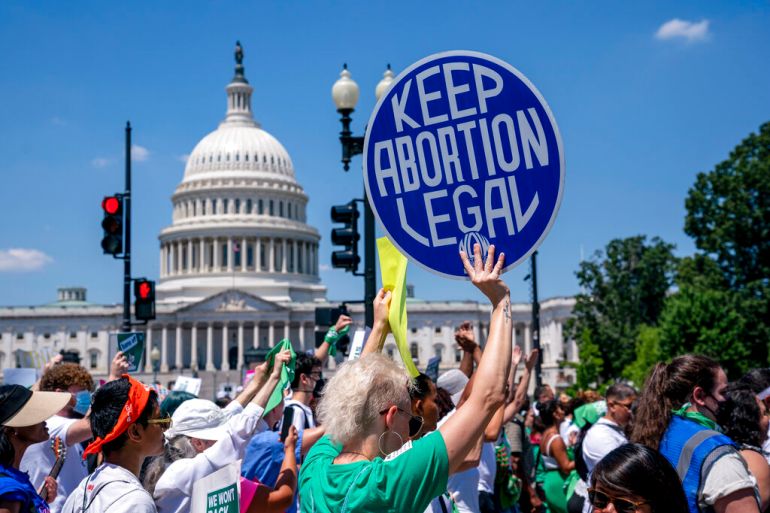Judge blocks enforcement of pre-Roe abortion ban in West Virginia
Judge’s ruling opens the door for abortion services to resume in US state in aftermath of overturning of Roe v Wade.

A judge in West Virginia has blocked authorities in the US state from enforcing an abortion ban that dates back to the 1800s, as fierce legal battles continue following the United States Supreme Court’s decision last month to overturn the landmark Roe v Wade abortion ruling.
Kanawha County Circuit Court Judge Tera L Salango granted the Women’s Health Center of West Virginia – the state’s only abortion clinic – a preliminary injunction against the ban on Monday, opening the door for abortion services to resume.
Keep reading
list of 3 itemsTexas contests federal order to grant life-saving abortions
US House votes to restore abortion rights after end of Roe
Salango said that in the absence of action by the court, the state’s sole abortion clinic and its patients, “especially those who are impregnated as a result of a rape or incest, are suffering irreparable harm”.
Attorney General Patrick Morrisey decried the ruling, calling it “a dark day for West Virginia”, and said his office would appeal to the state Supreme Court.
West Virginia has a state law on the books dating back to the 1800s making performing or obtaining an abortion a felony, punishable by up to a decade in prison. It provides an exception for cases in which a pregnant person’s life is at risk.
Lawyers for the Women’s Health Center had argued that the old law is void because it has not been enforced in more than 50 years and has been superseded by a slew of modern laws regulating abortion that acknowledge a woman’s right to the procedure.
One example is West Virginia’s 2015 law, which allows abortions until 20 weeks of pregnancy.
“We applaud the court’s decision to block this archaic ban. No one should be forced to carry a pregnancy to term,” the American Civil Liberties Union (ACLU) said on Twitter in response to the judge’s ruling.
The case is one of several legal battles being waged to shape the post-Roe landscape in the US, as conservative states push for restrictions while the federal government and liberal states look for ways to maintain access to abortion.
And the decision came hours after a Louisiana judge extended a temporary block on that state from enforcing a so-called “trigger” law ban designed to snap into effect if the high court overturned Roe.
According to the Guttmacher Institute, a reproductive rights group, at least 26 US states are expected to try to ban abortion in the aftermath of the Supreme Court’s overturning of Roe on June 24. That landmark 1973 decision set out the constitutional right to abortion in the country.
VICTORY: A Court has blocked West Virginia’s cruel and archaic abortion ban by issuing a preliminary injunction. Our work isn't done yet, however. We will need you to stand with us in the coming fight at the legislature.
— ACLU of WV (@ACLU_WV) July 18, 2022
Rights advocates have argued that abortion bans will disproportionately harm Black people and low-income Americans.
In the West Virginia case, Judge Salango agreed with the Women’s Health Center of West Virginia’s argument that the law was effectively repealed by more modern, post-Roe statutes that “hopelessly conflict” with the old one.
She called it unfair to allow the state to maintain conflicting laws on its books and that the clinic and its patients were suffering as a result.
“It simply does not matter if you are pro-choice or pro-life,” she said. “Every citizen in this state has a right to clearly know the laws under which they are expected to live.”
The Women’s Health Centre suspended abortion services on the day of the Supreme Court’s decision last month, which forced staffers to cancel dozens of abortion appointments, fearing they or their patients could be prosecuted under the old statute.
The clinic’s attorneys said abortion services are essential health care, and the state’s most vulnerable residents are put at risk every day that they do not have access to that care.